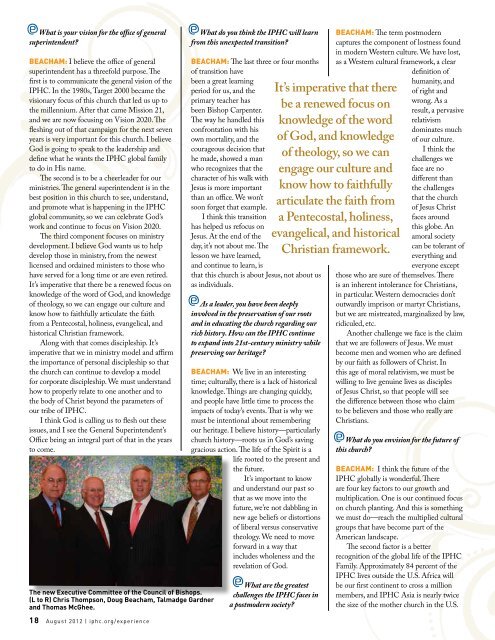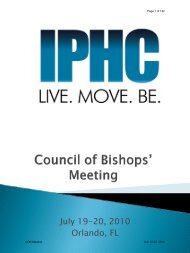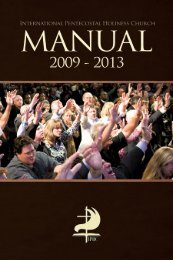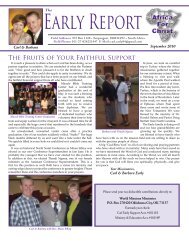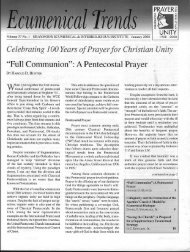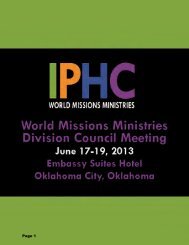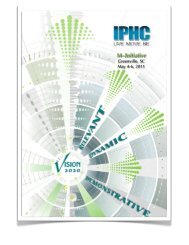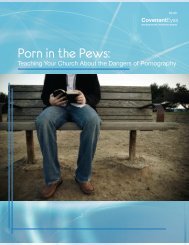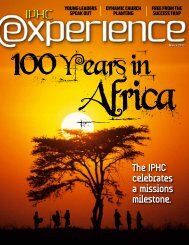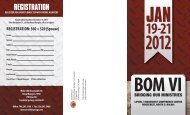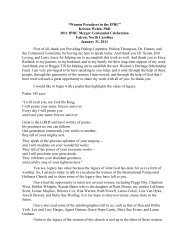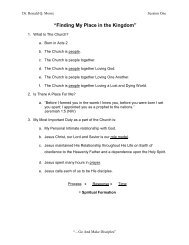single pages. - International Pentecostal Holiness Church
single pages. - International Pentecostal Holiness Church
single pages. - International Pentecostal Holiness Church
Create successful ePaper yourself
Turn your PDF publications into a flip-book with our unique Google optimized e-Paper software.
What is your vision for the office of general<br />
superintendent?<br />
BEACHAM: I believe the office of general<br />
superintendent has a threefold purpose. The<br />
first is to communicate the general vision of the<br />
IPHC. In the 1980s, Target 2000 became the<br />
visionary focus of this church that led us up to<br />
the millennium. After that came Mission 21,<br />
and we are now focusing on Vision 2020. The<br />
fleshing out of that campaign for the next seven<br />
years is very important for this church. I believe<br />
God is going to speak to the leadership and<br />
define what he wants the IPHC global family<br />
to do in His name.<br />
The second is to be a cheerleader for our<br />
ministries. The general superintendent is in the<br />
best position in this church to see, understand,<br />
and promote what is happening in the IPHC<br />
global community, so we can celebrate God’s<br />
work and continue to focus on Vision 2020.<br />
The third component focuses on ministry<br />
development. I believe God wants us to help<br />
develop those in ministry, from the newest<br />
licensed and ordained ministers to those who<br />
have served for a long time or are even retired.<br />
It’s imperative that there be a renewed focus on<br />
knowledge of the word of God, and knowledge<br />
of theology, so we can engage our culture and<br />
know how to faithfully articulate the faith<br />
from a <strong>Pentecostal</strong>, holiness, evangelical, and<br />
historical Christian framework.<br />
Along with that comes discipleship. It’s<br />
imperative that we in ministry model and affirm<br />
the importance of personal discipleship so that<br />
the church can continue to develop a model<br />
for corporate discipleship. We must understand<br />
how to properly relate to one another and to<br />
the body of Christ beyond the parameters of<br />
our tribe of IPHC.<br />
I think God is calling us to flesh out these<br />
issues, and I see the General Superintendent’s<br />
Office being an integral part of that in the years<br />
to come.<br />
The new Executive Committee of the Council of Bishops.<br />
(L to R) Chris Thompson, Doug Beacham, Talmadge Gardner<br />
and Thomas McGhee.<br />
18 August 2012 | iphc.org/experience<br />
What do you think the IPHC will learn<br />
from this unexpected transition?<br />
BEACHAM: The last three or four months<br />
of transition have<br />
been a great learning<br />
period for us, and the<br />
primary teacher has<br />
been Bishop Carpenter.<br />
The way he handled this<br />
confrontation with his<br />
own mortality, and the<br />
courageous decision that<br />
he made, showed a man<br />
who recognizes that the<br />
character of his walk with<br />
Jesus is more important<br />
than an office. We won’t<br />
soon forget that example.<br />
I think this transition<br />
has helped us refocus on<br />
Jesus. At the end of the<br />
day, it’s not about me. The<br />
lesson we have learned,<br />
and continue to learn, is<br />
that this church is about Jesus, not about us<br />
as individuals.<br />
As a leader, you have been deeply<br />
involved in the preservation of our roots<br />
and in educating the church regarding our<br />
rich history. How can the IPHC continue<br />
to expand into 21st-century ministry while<br />
preserving our heritage?<br />
BEACHAM: We live in an interesting<br />
time; culturally, there is a lack of historical<br />
knowledge. Things are changing quickly,<br />
and people have little time to process the<br />
impacts of today’s events. That is why we<br />
must be intentional about remembering<br />
our heritage. I believe history—particularly<br />
church history—roots us in God’s saving<br />
gracious action. The life of the Spirit is a<br />
life rooted to the present and<br />
the future.<br />
It’s important to know<br />
and understand our past so<br />
that as we move into the<br />
future, we’re not dabbling in<br />
new age beliefs or distortions<br />
of liberal versus conservative<br />
theology. We need to move<br />
forward in a way that<br />
includes wholeness and the<br />
revelation of God.<br />
What are the greatest<br />
challenges the IPHC faces in<br />
a postmodern society?<br />
BEACHAM: The term postmodern<br />
captures the component of lostness found<br />
in modern Western culture. We have lost,<br />
as a Western cultural framework, a clear<br />
definition of<br />
humanity, and<br />
of right and<br />
wrong. As a<br />
result, a pervasive<br />
relativism<br />
dominates much<br />
of our culture.<br />
I think the<br />
challenges we<br />
face are no<br />
different than<br />
the challenges<br />
that the church<br />
of Jesus Christ<br />
faces around<br />
this globe. An<br />
amoral society<br />
can be tolerant of<br />
everything and<br />
everyone except<br />
those who are sure of themselves. There<br />
is an inherent intolerance for Christians,<br />
in particular. Western democracies don’t<br />
outwardly imprison or martyr Christians,<br />
but we are mistreated, marginalized by law,<br />
ridiculed, etc.<br />
Another challenge we face is the claim<br />
that we are followers of Jesus. We must<br />
become men and women who are defined<br />
by our faith as followers of Christ. In<br />
this age of moral relativism, we must be<br />
willing to live genuine lives as disciples<br />
of Jesus Christ, so that people will see<br />
the difference between those who claim<br />
to be believers and those who really are<br />
Christians.<br />
It’s imperative that there<br />
be a renewed focus on<br />
knowledge of the word<br />
of God, and knowledge<br />
of theology, so we can<br />
engage our culture and<br />
know how to faithfully<br />
articulate the faith from<br />
a <strong>Pentecostal</strong>, holiness,<br />
evangelical, and historical<br />
Christian framework.<br />
What do you envision for the future of<br />
this church?<br />
BEACHAM: I think the future of the<br />
IPHC globally is wonderful. There<br />
are four key factors to our growth and<br />
multiplication. One is our continued focus<br />
on church planting. And this is something<br />
we must do—reach the multiplied cultural<br />
groups that have become part of the<br />
American landscape.<br />
The second factor is a better<br />
recognition of the global life of the IPHC<br />
Family. Approximately 84 percent of the<br />
IPHC lives outside the U.S. Africa will<br />
be our first continent to cross a million<br />
members, and IPHC Asia is nearly twice<br />
the size of the mother church in the U.S.


